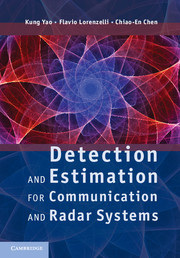Book contents
- Frontmatter
- Dedication
- Contents
- Preface
- 1 Introduction and motivation to detection and estimation
- 2 Review of probability and random processes
- 3 Hypothesis testing
- 4 Detection of known binary deterministic signals in Gaussian noises
- 5 M-ary detection and classification of deterministic signals
- 6 Non-coherent detection in communication and radar systems
- 7 Parameter estimation
- 8 Analytical and simulation methods for system performance analysis
- Index
8 - Analytical and simulation methods for system performance analysis
Published online by Cambridge University Press: 05 July 2013
- Frontmatter
- Dedication
- Contents
- Preface
- 1 Introduction and motivation to detection and estimation
- 2 Review of probability and random processes
- 3 Hypothesis testing
- 4 Detection of known binary deterministic signals in Gaussian noises
- 5 M-ary detection and classification of deterministic signals
- 6 Non-coherent detection in communication and radar systems
- 7 Parameter estimation
- 8 Analytical and simulation methods for system performance analysis
- Index
Summary
In this chapter we consider various analytical and simulation tools for system performance analysis of communication and radar receiver problems. In Section 8.1, we treat the analysis of receiver performance with Gaussian noise, first using the closure property of Gaussian vectors under linear operations. We then address this issue without using this closure property. Section 8.2 deals with the analysis of receiver performance with Gaussian noise and other random interferences caused by intersymbol interferences (ISI) due to bandlimitation of the transmission channel. Section 8.2.1 introduces the evaluation of the average probability of error based on the moment bounding method. Section 8.3 considers the analysis of receiver performance with non-Gaussian noises including the spherically invariant random processes (SIRP). By exploiting some basic properties of SIRP, Section 8.3.1 obtains a closed form expression for the receiver. We determine the average probability of error for the binary detection problem with additive multivariate t-distributed noise (which is a member of SIRP). Section 8.3.2 again uses some properties of SIRP to model wireless fading channels with various fading envelope statistics. By using Fox H-function representations of these pdfs, novel average probability of error expressions under fading conditions can be obtained. Section 8.3.3 treats the probabilities of a false alarm and detection of a radar problem with a robustness constraint. Section 8.4 first shows a generic practical communication/radar system, which may have various complex operations, making analytical evaluation of system performance in many cases difficult.
- Type
- Chapter
- Information
- Detection and Estimation for Communication and Radar Systems , pp. 271 - 317Publisher: Cambridge University PressPrint publication year: 2013



